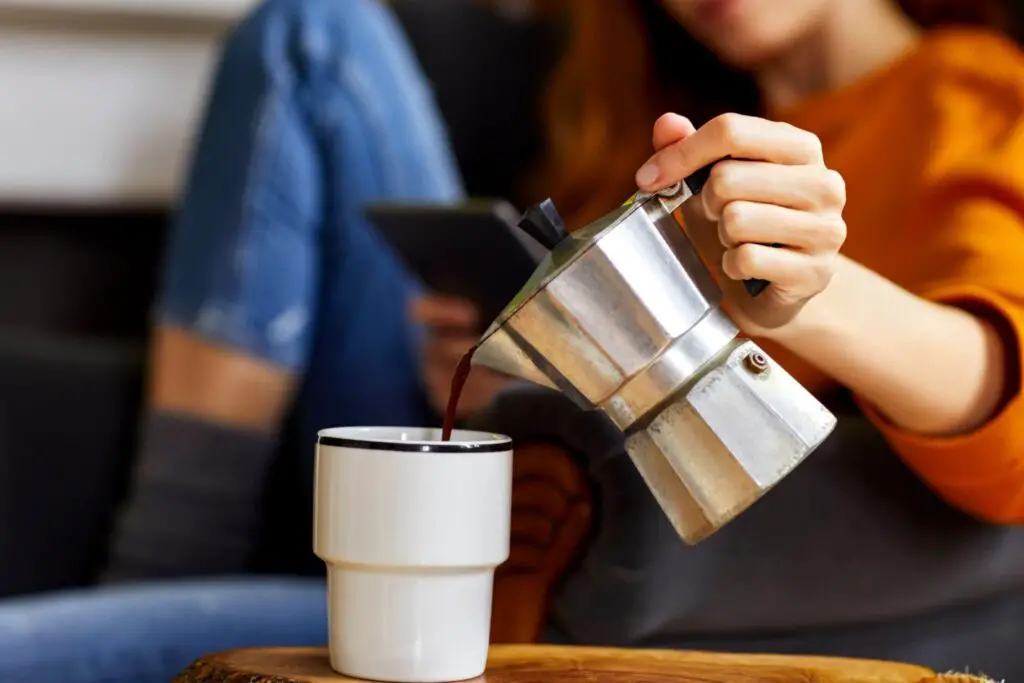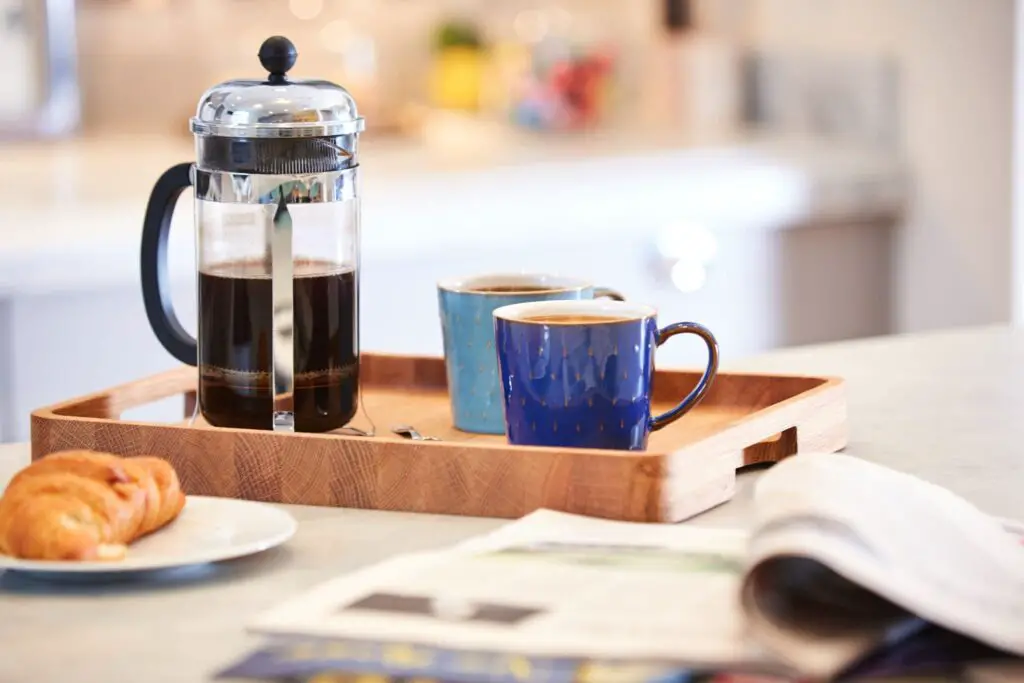If you’re a coffee lover, then you know that making the perfect pot of coffee is an art form. And one of the most important aspects of creating a smooth, flavorful brew is getting the proper ratio of coffee to water. But how many scoops of coffee for 8 cups? Should it be more or less than you’ve been using? In this blog post, we’ll explore the ideal coffee-to-water ratio for a perfect pot of 8 cups and give you some tips on achieving your desired strength and flavor. So let’s get brewing!
The Importance Of Measuring Coffee Accurately
Measuring coffee accurately is essential for consistently achieving a perfect cup of coffee. Using a bre
wing scale can make it easy to measure the exact amount of coffee beans required and prevent the build-up of coffee grounds in the machine. However, it is important to note that not all modern analog scales are sensitive enough to measure within 1 gram of accuracy. This is where a coffee refractometer can come in handy.
It can help focus on quality and accuracy, ensuring the best-tasting cup of coffee. Specialty coffee scores more than 80 out of 100 on the Specialty Coffee Association of America scale and requires accurate measurement to achieve the correct ratio between coffee grounds and extraction weight. Therefore, it is crucial to find the proper measurement tools for one’s preferred brewing method
The General Rule Of Thumb For Coffee To Water Ratio
When it comes to brewing a perfect cup of coffee, the coffee-to-water ratio plays a vital role in determining the flavor and consistency of the final product. Generally, it is recommended to use a ratio of 1:15 or 1:17, which means one part of coffee, to fifteen or seventeen parts of water. This ratio ensures that the coffee is not weak or strong and the flavors are well-balanced.
However, the coffee-to-water ratio can vary depending on the coffee type and the preparation method. As a friendly tip, it’s always a good idea to experiment with the ratio and find out what works best for your tastebuds. With the proper coffee-to-water ratio, you can enjoy a perfect cup of coffee every time.
Different Methods To Measure Coffee For 8 Cups
When making coffee at home, getting the right measurements is key to achieving a delicious, consistent brew every time. For an 8-cup coffee maker, you can use a few different methods to measure the coffee grounds. One common approach is using a coffee scoop, which typically measures around two tablespoons per scoop.
Depending on the strength of the desired coffee, anywhere from 8-12 scoops may be needed for 8 cups. Another option is to use a kitchen scale and measure out the coffee grounds by weight. A general rule of thumb is to use about 0.36 oz of coffee grounds per cup of water. Of course, different coffee blends and personal taste preferences may require these measurements to be adjusted.
How Many Scoops Of Coffee For 8 Cups?
When someone is making coffee for a group of friends or family, they might wonder how many scoops of coffee they need for a perfect pot of 8 cups. According to general guidelines, they can use about two tablespoons of coffee grounds for every 8 ounces of water. That means for 8 cups of coffee, and they will need 14 to 18 tablespoons of coffee grounds, using six ounces of water per cup.
Of course, this is just a starting point, and they can adjust the amount of coffee to their preferred strength. It’s always important to remember that the perfect pot of coffee can vary from person to person, so it’s always best to experiment until it’s just right.
Read more:
- How Much Caffeine is in a Latte? An Overview of the Popular Coffee Beverage
- How Much Caffeine Is in Mcdonald’s Iced Coffee?
- Keeping It Fresh: How Long Are Coffee Beans Good For?
Factors That Can Affect The Coffee-to-water Ratio
One of the most important factors in preparing a great cup of coffee is the ratio of coffee to water. The amount of coffee used can significantly affect the taste and quality of the final product. Factors that can affect the coffee-to-water ratio include the degree of grinding of the coffee, the time and method of preparation, and the freshness of the beans. It’s important to remember that the higher the percentage of water used, the lower the strength of the coffee.
Additionally, using freshly roasted beans can greatly improve the taste of your coffee. With a kettle, grinder, and professionally roasted specialty coffee, anyone can make a delicious cup of coffee right at home!
Factors That Can Affect The Strength And Taste Of The Coffee

When it comes to coffee, many factors can affect its taste and strength. One of the most important factors is the type of beans used. There are four main types of coffee beans, including Arabica, Robusta, Liberica, and Excelsa, and each has its unique characteristics. Another important factor is the geographical region where the coffee is grown. Different areas produce different flavors due to soil, climate, and altitude variations. The roast level is also essential, as it affects the coffee’s taste, body, and acidity.
Additionally, the temperature and humidity during cultivation and growth also play a role in the final taste of the coffee. Soil conditions and the level of caffeine content can also affect the flavor profile. Understanding all these factors and customizing the coffee to suit personal preferences is essential to ensure the best possible flavor. By understanding these factors and using the right combination, one can produce a delicious cup of coffee that matches their preferences.
Tips To Ensure A Perfect Cup Of Coffee
- Clean Your Tools: Experts say that cleaning the tools used in preparing coffee is crucial. Pay special attention to your electric kettle, which can accumulate build-up from frequent use without cleaning.
- Choose The Right Pot: Choosing the right pot when making coffee is important. A pot with a narrow and thin neck helps to form the perfect coffee aroma.
- Drink While It’s Hot: Enjoy your coffee while it’s hot! Leaving it to cool or become warm can cause it to lose much of its flavor and taste.
- Rinse The Filter: Before you brew your coffee, rinse the paper filter with hot water first. This removes the papery aftertaste that can affect the taste of your coffee.
- Grind Fresh Beans: Finely grind fresh coffee beans for the best flavor. Freshly ground beans create a deeper and richer taste, so avoid pre-ground coffee if possible.
- Measure Your Coffee: Measure out your coffee to ensure consistency in taste. One or two tablespoons of coffee grounds per six-ounce cup of water is a good measure.
- Water Quality Matters: Use high-quality water when preparing your coffee. The water should be clean, fresh, and cold, as impurities can negatively impact your coffee taste.
- Brew At The Right Temperature: Brew your coffee at the right temperature for the best flavor. The optimal temperature range for hot coffee is between 195 and 205 degrees Fahrenheit.
- Patience Is Key: Take your time to brew the perfect cup of coffee. Give the water time to pass through the grounds, and don’t rush the process.
- Experiment with Different Types of Coffee: Finally, feel free to experiment with different types of coffee. Trying new and different coffee can be an exciting and fun journey, whether it’s single-origin, blends, or roasts.
Experimenting With Different Measurements For Personal Preference
Experimenting with different measurements for personal preference is an exciting way to determine the best experience for individuals in any testing or performance evaluation scenario.
Scientists have established different scientific research standards to measure data accurately. These standards include the nominal scale, the ordinal scale, and the time interval scale. Moreover, telemetry can be used to display the number of times a user switches between different SKUs before attempting a purchase, which can help understand the preferences and behavior of the user.
The Caliper Profile is another tool used to measure personality traits and motivations to predict behavior and potential performance in a job. Regardless of the focus, conducting A/B testing based on personal preferences or user influences is crucial.
One can create a more personalized experience that caters to individual preferences by implementing various measurements. It ensures that the best possible results are achieved and provides a better understanding of user behavior for future decisions.
Tips For Measuring Your Coffee Correctly
- Start with a snack – Before measuring your coffee, have a snack to cleanse your palate and avoid any residual flavors affecting your coffee’s taste.
- Use a high-quality grinder – Investing in a high-quality grinder ensures your coffee is ground evenly, resulting in a better cup.
- Store beans properly – Storing your coffee beans in an airtight container can prolong the beans’ freshness, resulting in a better-tasting coffee.
- Measure by weight, not volume – Measuring your coffee by weight, using a kitchen scale, ensures accuracy and consistency in every cup.
- Use the correct ratio – Generally, use two tablespoons of coffee per six ounces of water to create a balanced cup of coffee.
- Start with a small amount – When measuring your coffee, start with a small amount, then add more as needed to avoid wasting beans or overfilling the container.
- Allow for machine differences – Different coffee makers may require different measurements, so adjust accordingly to achieve the best cup of coffee with your specific machine.
- Experiment – Tweak your measurements to find the perfect balance that suits your taste buds. Experimenting and adjusting can lead to discovering your ideal cup of coffee.
Other Variables To Consider For The Perfect Pot Of Coffee, Such As Water Temperature And Brew Time
There are a few other variables that one should consider when aiming for the perfect pot of coffee beside the ideal temperature range of 195 to 205 degrees Fahrenheit. One of these variables is the water temperature, which should also be between 195 to 205 degrees Fahrenheit. The reasons for this are twofold: the water needs to be hot enough to extract the coffee’s flavors and oils properly but not so hot that it burns the grounds. Another variable to consider is the brew time, which varies depending on the brewing method.
For example, French press coffee should steep for around four minutes, while drip coffee usually takes about five to six minutes. Lastly, using the proper coffee grounds is important for achieving the perfect pot. I suggest using approximately one to two tablespoons of coffee grounds per six ounces of water.
Considering all of these variables will ensure that the final product is a well-balanced, delicious cup of coffee.
FAQ
Q: How many scoops of coffee should I use for a perfect pot of 8 cups of coffee?
A: For eight cups of coffee, you would need eight scoops of coffee. However, this is just a general rule of thumb. The recommended amount for measuring coffee grounds on a Glass Carafe is to get one scoop for every two cups of coffee, which means you would need four scoops for 8 cups of coffee brewing.
Q: How many grams of coffee should I use for 8 cups?
A: To make 8 cups of coffee, you’ll need eight scoops, equivalent to 75 to 100 grams of coffee grounds or 15 to 20 tablespoons.
Q: How many tablespoons of coffee should I use per cup?
A: A general guideline is the Golden ratio – 2 tablespoons of ground coffee for every 8 ounces cup. Most coffee makers produce 12 cups of coffee at 8 ounces per cup.
Q: What is the best ratio of coffee to water?
A: It depends on personal preferences, but a good starting point is to use one scoop of coffee for every two cups of water. This ratio can be adjusted based on the desired strength and taste of the coffee.
Q: How many scoops of coffee should I use if I like my coffee stronger?
A: If you like your coffee stronger, use more coffee grounds per cup. Start with one and a half to two scoops of coffee per cup, and adjust the ratio to your liking. Just remember that using too much coffee can result in a bitter taste.
Conclusion And Final Thoughts.
So there you have it, the perfect amount of coffee scoops for an 8-cup pot. But remember, the taste is subjective, so it’s important to adjust the amount based on your preference. And if you have any tips or tricks on making the perfect cup of coffee, let us know in the comments below! Happy brewing!
References

James Robinson loves coffee and blogging all about coffee. His blog is full of informative posts about the best ways to enjoy coffee and the many different types of coffee out there. He also shares recipes for delicious coffee-based dishes, and his followers can always count on him to offer tips on how to improve their coffee-making skills.


